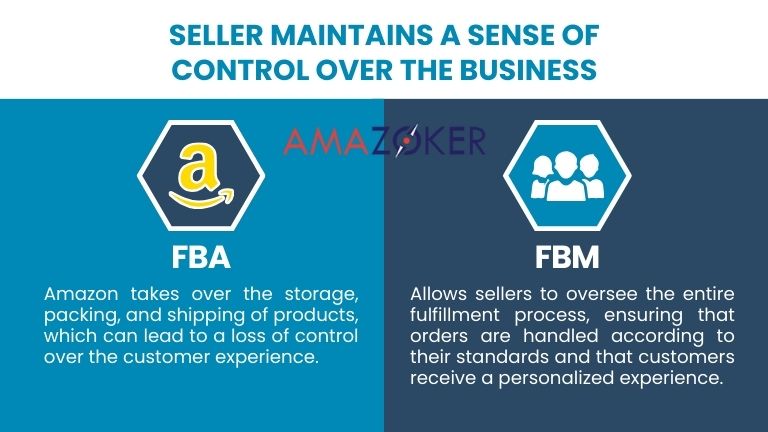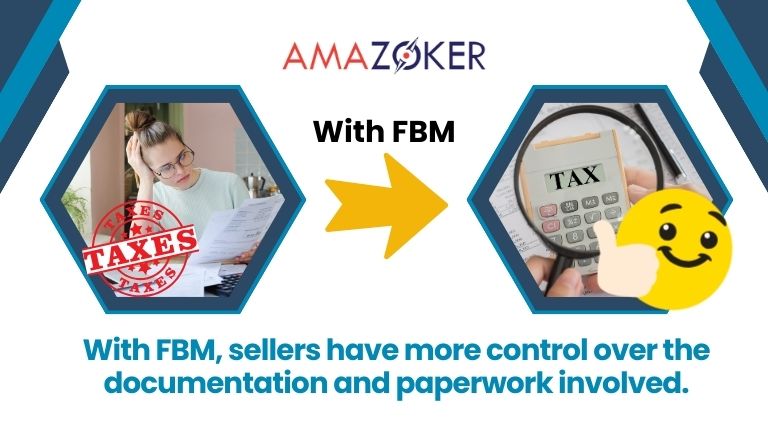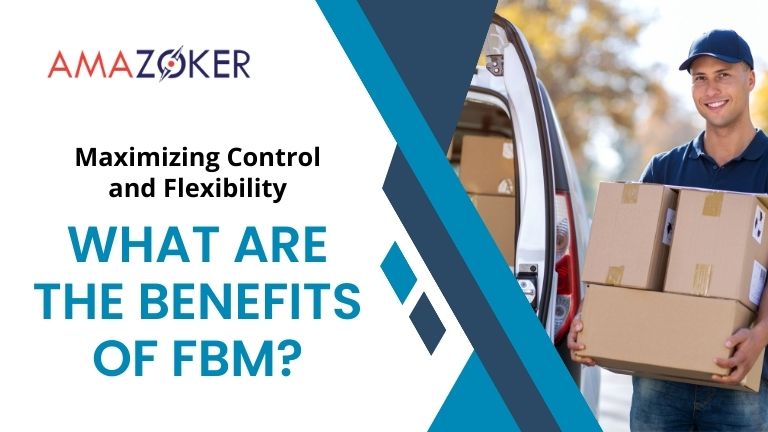Fulfillment by Merchant (FBM) is a popular method used by online sellers to manage their inventory and fulfill orders. Unlike Fulfillment by Amazon (FBA), where Amazon handles all aspects of order fulfillment, FBM allows sellers to maintain control over their business operations. While FBA may seem like the more convenient option, there are several benefits of FBM that make it a viable choice for many sellers. Let’s explore what the benefits of FBM are.
Table of Contents
- Seller retains a sense of authority over the business.
- Margins are greater
- The possibility of creating a separate brand is more attainable
- Fewer inevitable losses resulting from alterations in Amazon policies
- Less paperwork, particularly when dealing with non-sales-tax states
- Freedom to run the business exactly as seller chooses
- More control over your inventory
- No unexpected costs
- More convenient to manage both online and offline retail operations using a single inventory system
One of the main benefits of FBM is that the seller maintains complete control over their business.
With FBA, Amazon takes care of everything from storing inventory to shipping orders. While this may seem like a hassle-free option, it also means that the seller has little to no control over their own business operations. This can be problematic if there are any issues with the fulfillment process or if Amazon changes their policies, which can happen unexpectedly.
With FBM, the seller is responsible for managing their own inventory and fulfilling orders. This gives them a greater sense of control over their business and allows them to make decisions based on their own preferences and strategies. For example, if a seller wants to offer free shipping or use specific packaging materials, they have the freedom to do so without having to adhere to Amazon’s guidelines.

Compare FBA and FBM in terms of business control
Margins are greater
Margins are also greater with Fulfillment by Merchant. With FBM, sellers can save on the storage and fulfillment fees charged by Amazon for using their Fulfillment by Amazon (FBA) service. By handling the fulfillment process themselves, sellers can reduce costs and retain a larger portion of their revenue. This can be particularly advantageous for sellers with high-volume or high-margin products. Additionally, FBM allows sellers to have more control over their pricing strategies, enabling them to adjust prices to maximize profitability. Overall, FBM can provide sellers with the opportunity to achieve higher profit margins compared to using FBA.
The possibility of creating a separate brand is more attainable
Another benefit of Fulfillment by Merchant is that it provides sellers with the opportunity to build an independent brand. With FBM, sellers have more control over their product listings, packaging, and customer experience, allowing them to create a unique brand identity. They can customize their product descriptions, insert branding materials, and include personalized messages in their shipments. This level of control enables sellers to differentiate themselves from competitors and establish a distinct brand image in the marketplace. Building an independent brand can lead to increased customer loyalty, brand recognition, and long-term success. FBM allows sellers to focus on developing their brand identity and connecting with their target audience, rather than being solely associated with the Amazon platform.
Fewer inevitable losses resulting from alterations in Amazon policies
Amazon is known for frequently changing its policies, which can have a significant impact on sellers using FBA. For example, if Amazon decides to increase their fees or change their storage limits, sellers may have to adjust their pricing or inventory management strategies, which can result in financial losses.
With FBM, sellers have more control over their business and are less affected by changes in Amazon’s policies. They can make adjustments to their operations as needed without having to rely on Amazon’s guidelines. This reduces the risk of unexpected losses and allows sellers to have a more stable and predictable business model.
Less paperwork, particularly when dealing with non-sales-tax states
When it comes to paperwork, Fulfillment by Merchant can offer some advantages, especially when dealing with non-sales-tax states. With FBM, sellers handle the fulfillment and shipping process themselves, which means they have more control over the documentation and paperwork involved. This can be particularly beneficial when selling to customers in states that do not require sales tax to be collected.
In non-sales-tax states, with those benefits of FBM, sellers can avoid the administrative burden of collecting and remitting sales tax. They do not need to track and report sales tax for those specific states, simplifying their paperwork and reducing the associated compliance costs.

FBM simplifies the process of dealing with non-sales-tax states and reduces administrative burden
Freedom to run the business exactly as seller chooses
FBM gives sellers the freedom to run their business exactly as they choose. With FBM, sellers have complete control over their inventory, pricing, shipping methods, and customer experience. They are not bound by any specific policies or requirements imposed by a third-party fulfillment service like FBA.
This freedom allows sellers to customize their business operations to align with their unique goals and strategies. They can set their own pricing, create their own packaging and branding, and choose the shipping carriers and methods that work best for them. With the benefits of FBM, sellers have direct communication with their customers, build relationships and provide personalized support.
By having full control over their business, sellers can be more agile and responsive to market changes and customer demands. They can quickly adapt their strategies, experiment with different approaches, and make adjustments as needed to optimize their business performance.
More control over your inventory
The next benefit of FBM is that it gives sellers more control over their inventory. With FBM, sellers are responsible for handling their inventory, including storage, tracking, and replenishment.
Having control over inventory allows sellers to closely monitor stock levels, ensuring they have enough products available to meet customer demand. They can implement their own inventory management systems and strategies, such as using third-party software or implementing just-in-time inventory practices.
Additionally, FBM gives sellers the flexibility to make changes to their inventory quickly. They can add or remove products from their listings, adjust pricing, and make updates to product descriptions without relying on a third-party fulfillment service.
This level of control over inventory also enables sellers to have more accurate and up-to-date information on product availability. They can avoid potential stockouts or overselling issues that may occur with other fulfillment methods.
FBM gives sellers more control over their inventory, including storage, tracking, and replenishment
No unexpected costs
One of the biggest concerns for online sellers is unexpected costs. Sellers have more control over the fulfillment and shipping process, which can reduce the likelihood of unexpected expenses.
With FBA, Amazon charges fees for storage, fulfillment, and other services, which can add up quickly and eat into the seller’s profit margins. These fees can be unpredictable and may change at any time, making it difficult for sellers to plan and budget accordingly.
With FBM, sellers have more control over their costs and can avoid unexpected fees from Amazon. They can choose their own suppliers, shipping methods, and packaging materials, which can help them keep their costs low and increase their profit margins. This level of control can be particularly beneficial for small businesses or new sellers who are trying to establish themselves in the market.
More convenient to manage both online and offline retail operations using a single inventory system
As mentioned earlier, FBM allows sellers to use the same inventory for both online and offline retail activity. This not only makes it easier to manage their inventory, but it also allows them to offer a more seamless shopping experience for their customers. This can be particularly beneficial for businesses that have both an online and offline presence.
For example, if a customer purchases a product online and then decides to return it in-store, the seller can easily process the return without having to transfer inventory between locations. This can save time and resources and help improve the overall customer experience.
In conclusion, there are many benefits of FBM for online sellers. From greater autonomy and flexibility to cost savings and brand-building opportunities, FBM provides a compelling alternative to traditional fulfillment methods. By carefully considering the unique advantages of FBM, sellers can make informed decisions about the best fulfillment strategy for their business.
Read more:











